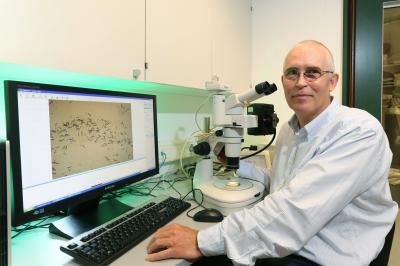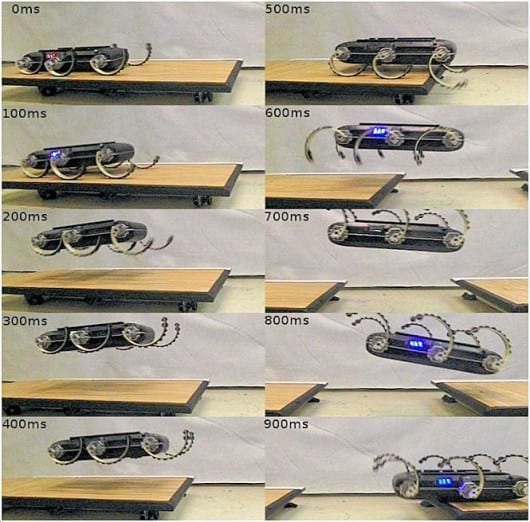
A lifespan extension of 60 percent has been achieved in worms by disrupting a mechanism in mitochondria using simple antibiotics
Why is it that within a homogeneous population of the same species, some individuals live three times as long as others? This question has stumped scientists for centuries.
Now, EPFL researchers led by Johan Auwerx report in the journal Nature how a mechanism in mice plays a determining role in longevity. And they go a step further: by disrupting this mechanism using simple antibiotics in a population of nematodes, or roundworms, they can multiply lifespan by a factor of 1.6.
Mitochondia: biological timekeepers
The process identified by EPFL scientists takes place within organelles called mitochondria, known as the cellular powerhouses because they transform nutrients into proteins including adenosine triphosphate (ATP), used by muscles as energy.
But that’s not all they do. Several studies have shown that mitochondria are also involved in aging. The new EPFL research, done in collaboration with partners in the Netherlands and the US, pinpoints the exact genes involved and measures the consequences to longevity when the amount of protein they encode for is varied: less protein, longer life.
Natural variations in mice
Laboratory mice in the BXD reference population typically live from 365 to 900 days. This population, which reflects genetic variations that occur naturally within a species, is used by many researchers in an approach known as “real-world genetics.” The benefit of working with this population in particular is that their genome is almost completely decoded.
The team led by professor Auwerx, head of EPFL’s Laboratory of Integrative and Systemic Physiology, analyzed mice genomes as a function of longevity and found a group of three genes situated on chromosome number two that, up to this point, had not been suspected of playing any role in aging. But the numbers didn’t lie: a 50 percent reduction in the expression of these genes—and therefore a reduction in the proteins they code for—increased mouse life span by about 250 days.
Extending life in worms
Next, the team reproduced the protein variations in a species of nematode, Caenorhabidtis elegans. “By reducing the production of these proteins during the worms’ growth phase, we significantly increased their longevity,” says Auwerx.
The average life span of a worm manipulated in this way went from 19 to more than 30 days, an increase of 60 percent. The scientists then conducted tests to isolate the common property and determined that the presence of mitochondrial ribosomal proteins (MRPs) is inversely proportional to longevity.
Life-prolonging stress
The researchers concluded that a lack of MRP at certain key moments in development created a specific stress reaction known as an “unfolded protein response” within the mitochondria. “The strength of this response was found to be directly proportional to the life span,” says Auwerx. “However, we noted that it was more pronounced if the protein imbalance—the reduction in MRP— occurred at a young age. A similar stimulation in an adult did not affect the worms’ longevity.”
What’s more, the effect can be induced without genetically manipulating the worms. “Exposure to certain readily available drugs inhibits ribosomal function and thus causes the desired reaction,” says Auwerx. In other words, mitochondria are sensitive to certain antibiotics, and the drugs can be used to prolong life.
The Latest Bing News on:
Slowing the aging process
- I follow Chinese medicine for anti-aging – my go-to food combats gray hair & promotes growth, I take it daily with honeyon April 27, 2024 at 8:59 am
AN ingredient commonly used for garnishing salads and in baking recipes could be the key to preventing hair from graying. A beauty guru revealed how combining it with honey improves absorption for ...
- If You Were Born After 1965, Your Cells Might Be Aging Fasteron April 23, 2024 at 7:57 am
Research suggests that accelerated aging is linked to higher rates of early-onset cancers. Longevity researchers say they want to slow biological aging to prevent chronic diseases, like cancers.
- Limiting calories might extend lifespan by slowing aging: new studyon April 22, 2024 at 6:23 am
New research suggests caloric reduction could prolong life by slowing aging. NEW YORK, April 22: Researchers at Penn State University have unveiled new findings that establish a significant connection ...
- A cheap drug may slow down aging. A study will determine if it workson April 22, 2024 at 2:01 am
Studies suggest people who take metformin for diabetes may be at lower risk for cancer, heart disease and dementia. Now researchers aim to test if it prevents age-related diseases in healthy people.
- ROUNDING THIRD: We're not meant to understand all the quirks of agingon April 19, 2024 at 5:00 am
Sometimes I can’t quite understand the aging process. For instance, the realization hit me the other day that there must be something wrong with the lower half of my right ...
- Tally Health CEO Melanie Goldey On Wellness, Aging And Beauty Sleepon April 17, 2024 at 5:56 am
The definition of beauty has really changed,” she said. "It’s about skincare and science-backed solutions. Beauty from the inside out. Wellness is being your best self.” ...
- For Secrets to Extending Human Lives, Keep the Dog Aging Project Aliveon April 16, 2024 at 10:00 pm
It was never only about the dogs. It’s always been about people too – and our need to extend health and well-being now that we’ve devised so many ways to keep ourselves alive longer.
- Study finds adults are aging faster. How to slow the process.on April 15, 2024 at 4:57 am
Younger adults are aging faster, increasing their risk for early onset cancers. So which anti-aging techniques actually work?
- Sign of Aging Reversed by Simple Exerciseon April 15, 2024 at 12:59 am
"Everyone says that '[aging is] just part of getting older,' but this doesn't actually have to be true," researchers say.
- This Diet Slows Aging and Lowers Dementia Risk, Study Findson April 14, 2024 at 7:30 am
Following the MIND diet may help slow aging and lower dementia risk, according to new research. Nutrition experts explain the findings.
The Latest Google Headlines on:
Slowing the aging process
[google_news title=”” keyword=”Slowing the aging process” num_posts=”10″ blurb_length=”0″ show_thumb=”left”]
The Latest Bing News on:
Aging
- Agency on Aging seeks applicants for grant-funded serviceson April 27, 2024 at 8:00 am
Western Illinois Area Agency on Aging (WIAAA) will release a competitive request for proposal on May 6 for Title III grant-funded services for transportation, nutrition services (congregate and home ...
- Celebrities Quietly Paying Huge Amounts for Anti-Aging Stem Cell Therapy That May Cause Gruesome Side Effectson April 27, 2024 at 6:31 am
Experts caution that there's limited evidence backing the benefits of these stem cell treatments, while pointing to plenty of risks.
- Explosive growth, tourism weigh heavy on Western Montana’s aging roadson April 27, 2024 at 6:06 am
The increased traffic, along with Montana’s harsh weather, puts more wear and tear on roads, Boucher said. Many of the state’s bridges are nearing the end of their design life, contributing to the ...
- Best anti-aging eye creams to help you turn back the clockon April 26, 2024 at 8:57 pm
Our guide to the best anti-aging eye creams will help you to rejuvenate the skin around your eyes and reduce the signs of aging, with clinically proven results.
- Bus riders bemoan aging fleet, suspended routes: What Ithaca's transit agency is doingon April 26, 2024 at 11:11 am
Tompkins County’s Transportation Equity Coalition has released the results of a county-wide Transportation Equity Needs Assessment , which found that self-identified limited, low or no-income county ...
- Curling and the nuances of aging: A study on older Canadian women’s experienceson April 26, 2024 at 11:00 am
Older Canadian women use curling to manage aging, showing that the sport helps them resist physical and cognitive decline, adapt to age-related changes with inclusive modifications, and redefine aging ...
- Does reproduction influence epigenetic aging in younger women?on April 24, 2024 at 5:00 pm
A recent Proceedings of the National Academy of Sciences study investigated the association between reproduction and biological aging based on epigenetic clocks. From the 8th to the 19th century, ...
- Silver hair, silver dollars: Wyoming's aging population means big spending for the stateon April 24, 2024 at 12:21 pm
The graying of America, and Wyomingites, need long-term care in the coming decades. How will the state deal with the cost?
- The dual challenge of the sandwich generation: Raising children while caring for aging parentson April 24, 2024 at 9:42 am
Lisa Ling is a CBS News contributor and part of the sandwich generation herself. Ling's family is part of nearly 80 million Americans taking care of children and our elderly parents at the same time.
- The 11 Best Anti-Aging Serums for Firmer, Brighter Skin, According to Real Womenon April 24, 2024 at 4:15 am
Anti-aging serums can be an aid during this physical change, which starts when collagen production drops in our 20s. Just as daily vitamins bridge nutritional deficiencies, anti-aging serums “deliver ...
The Latest Google Headlines on:
Aging
[google_news title=”” keyword=”aging” num_posts=”10″ blurb_length=”0″ show_thumb=”left”]











